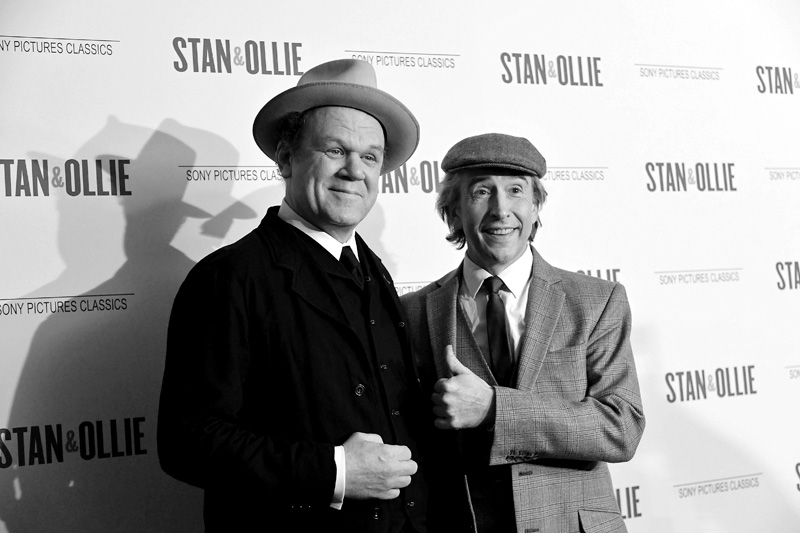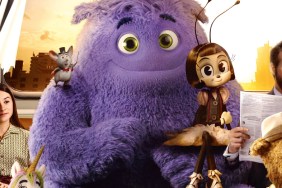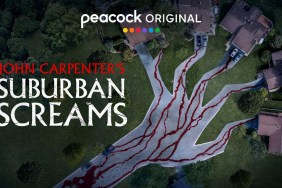Sony Pictures Classics invited ComingSoon.net to interview acclaimed actors Steve Coogan and John C. Reilly about portraying Stan Laurel and Oliver Hardy in the Stan & Ollie biopic. Check out the insightful interview below!
Stan & Ollie is a drama that follows the legendary comedy duo Laurel & Hardy during their 1953 variety hall tour of Britain which began with low attendance and eventually became a hit with old and new fans. The film stars Oscar nominees Coogan (Philomena, The Trip) as Stan Laurel and Reilly (Chicago, Holmes and Watson) as Oliver Hardy, the iconic comedians.
RELATED: Sony Pictures Classics Releases New Trailer For Stan and Ollie
The story centers on Laurel & Hardy, the world’s favorite comedy double act, who set out on a variety hall tour of Britain in 1953. Diminished by age and with their golden era as the kings of Hollywood comedy now behind them, they face an uncertain future. Despite the pressure of a hectic schedule, with the support of their wives Lucille (Shirley Henderson) and Ida (Nina Arianda) – a formidable double act in their own right – the pair’s love of performing, as well as love for each other, endures as they secure their place in the hearts of their adoring public. As they set out, crisscrossing the country, attendances are disappointingly low. But they’ve always been able to make each other laugh and as the charm and beauty of their performances shines through their audiences laugh too, and they re-connect with legions of adoring fans, old and new.
Stephanie Hyam (Peaky Blinders, Bodyguard) and Golden Globe nominee Danny Huston (Magic City, Yellowstone) also star in the feature written by Oscar-nominated screenwriter Jeff Pope (Philomena). The movie is produced by eOne, BBC Films, and Fable Pictures with Faye Ward and Xavier Marchand serving as producers.
Stan & Ollie pratfalls into limited release on December 28.
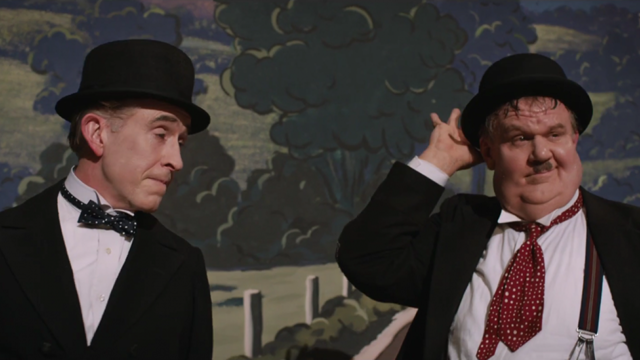
ComingSoon.net: John, you used prosthetics to make yourself appear 100 pounds heavier. It’s hard to imagine why your wouldn’t want to risk your health and livelihood to gain 100 pounds for this role.
Reilly: Well, each actor has their own way of finding their truth, you know? Some people do it that way, some people do it the way I did it, but there’s no judgment either way, you know? Whatever gets you through the night. Daniel Day Lewis is a very immersive actor, and I’ve worked with actors that just think of it as complete make believe. So there’s no judgment. I did gain weight for a role one time. It took me so long to lose it afterwards. I would never do that again.
Coogan: Well, and my approach to acting is you learn stuff about the character, you think about it, you give it your best shot and you try to take your brain somewhere else. But I didn’t have to wear 1950s underwear unseen beneath my suit because it would’ve been the authentic experience. I know some people like to do all that stuff. There are people in the UK who reenact battles who put lice into their clothes because they think that will make the experience authentic. I don’t think that’s necessary, and neither do I think it’s necessary to, you know, go to extremes. But there are people who do that, and they do very well and they win Academy Awards.
Reilly: Where do they buy the lice?
Coogan: You can mail order.
Reilly: Oh.
Coogan: I’m not kidding. They put the lice in their underwear.
Reilly: Go to the best lice houses in town.
Coogan: Yeah, it’s a limited market. No one’s going to retire on their lice sales.
CS: And Stan was an understudy of Chaplin.
Coogan: He was.
CS: He had some of the same creative control freak tendencies. But where Chaplin never really caught fire in the sound era, Laurel triumphed. Why do you think that was?
Coogan: Well, interesting question, because in the preparation I did for Stanley I was blessed with a little more source material than John had at his fingertips. One of those was that when Stan Laurel lived in Santa Monica, people would call him up on the telephone because his name was in the phonebook. He would talk to people, humor them in his retirement, and he would always be very fastidious in responding to the fan mail and the like. But a couple of the people who made these phone calls recorded them, so we were able to listen to Stanley’s answers in detail. One of the questions was about the transition from silent movies to sound. It was illuminating to hear Stanley say that when sound came along, everybody wanted to talk nonstop in the movies. So all these sound movies came out where people were talking nine to the dozen, talking, talking, talking, talking, and he said he and Ollie resisted that temptation to just get into lots of verbal spats. So there was dialogue, of course, but it was choice and it was judicious. What they didn’t do is throw the baby out of the bath water, because what made them funny were those moments that continued to make them funny after sound came in, which is just their expressions, those deadpan expressions that Oliver gives to the camera. A myriad of expressions that Stan Laurel does. They don’t require sound, but they didn’t abandon them as sound came in. I think that was the key to why they made a successful transition.
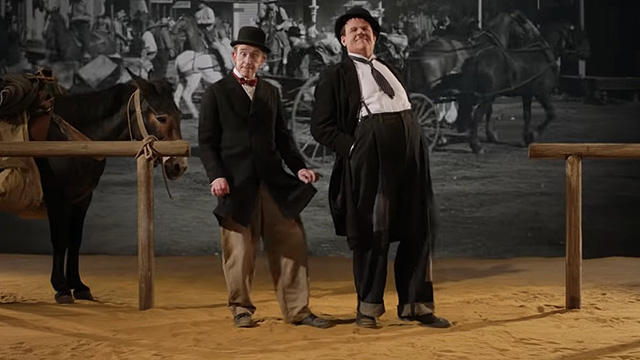
CS: Back in the days of Hal Roach these guys were pumping out movies like it was a literal factory. They had made hundreds of movies by the end of their career. You guys are very prolific, but have you ever experienced anything close to that factory mentality in either of your careers?
Reilly: Well, I made three movies back to back last year for the first time in my life. I made “Holmes and Watson,” then literally within a week I was starting “Stan & Ollie,” and then within a week I was starting “The Sisters Brothers.” And all the while through that, making the new “Wreck It Ralph.” So I don’t recommend it. It’s very tiring and it’s tough to reset yourself. But the thing is, with these guys, in some ways their films have this eternal quality, so it wasn’t like they were reinventing the wheel every time they started to do another film. These characters that they authored were really compelling personas. They had great chemistry and they worked right out of the gate. So even though they were doing film after film after film, in a way, the characters were a continuing throughline through all of those films. So I think that made it easier for them to just stay in the groove. And in fact, it was probably good for their creativity to keep working, working, keep the vibe going. And remember, they were working during the Great Depression, so they felt very lucky.
Coogan: Grateful, yeah, absolutely.
Reilly: So anyone who was working was showing up on time, you know? They were all really grateful to have a job then.
Coogan: I’ve experienced working intensively from project to project, not always the same project, but I think generally you can do that and you can be very creative, but you will burn out. If you want to have a long, sustained career, you need to have periods of fertile harvesting and then fallow periods, where you just step back and let things grow and let the soil replenish itself. That I think is good for your work and your art, and it’s also good for your health. So yeah, as John says, you’ve got to be careful about burning the candle at both ends.
CS: Then you don’t have anything to write or create something about.
Coogan: That’s the other thing is you need to experience life to have something worth saying. And if your only observations are about press junkets and hotel rooms, you’re going to run out of steam pretty quickly.
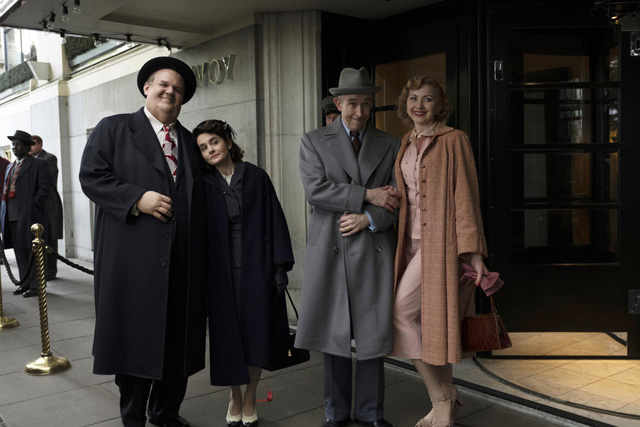
CS: I remember taking a trip to Ireland a few years ago and going to Blarney Castle and they still have photos of Laurel and Hardy during their tour there. Do you think that they were more revered overseas than they were in America?
Coogan: I think there’s certainly some truth there. You don’t mind me jumping in, right?
Reilly: At that moment, I would probably agree, yeah.
Coogan: Yeah, but I also think that when people become successful, sometimes there’s the thing about not being welcome in your own country. What’s true for Americans, and it’s also true for the British, is that familiarity can breed contempt. Abroad there’s still an exotic star quality to Laurel and Hardy, whereas back home in the States it’s a little bit like, “Yeah, yeah, we’ve seen those guys, been there, done that.”
Reilly: America after World War II is the period we’re talking about, when these guys realized “We’re not getting any more movie work, we’ve got to figure something out. Where can we go? Where can we do a vaudeville show where people would buy tickets?” And then they got this offer from Delfont in the UK. But you know, America post-war was a very different place than post-war England. America in post-war was exceptionalist, brand new big cars.
Coogan: Teenagers.
Reilly: To the victor, the spoils, you know? And England took a pretty hard hit during World War II, so they were still struggling to get back on their feet and it was still almost like a rationing war time mentality. So that made a really evocative setting for our movie, but it also tells you a little bit about the audiences in those two places. And I think what happened in America with Laurel and Hardy was after World War II, there was that kind of smart aleck exceptionalist new American identity that was coming forward. And these sweet clowns that were like humanists suddenly seemed to most people, I think, like a bygone era, you know? We were now in an era where six million people were killed in ovens and the depravity that the war showed the world made the world a little bit of a harder place. So coming to England, I think those people still, they weren’t in that “to the victors the spoils” kind of mentality.
Coogan: We have everything. And also, the country was half-destroyed, too. But it’s interesting because in America during that period “teenagers” was a new term that had been coined. We didn’t have teenagers in Great Britain until the 60’s, really. You know, it’s like America got there first, and that optimism of America in the 50’s where everything was bright and colorful and consumerist didn’t reach the UK until the 60’s. We had our 50’s in the 60’s.
CS: What’s also interesting about that period is that’s when the packages of the films started appearing on television. Stan had actually offered to recut them for TV broadcast because the films still had all the pauses for audience laughter.
Coogan: Yeah, because he got annoyed when he saw that they would…
Reilly: Cut to a commercial in the middle of a joke.
Coogan: Cut to a commercial in the middle of something, it would make him mad. And he offered to do it for nothing because he just didn’t want to see his work misrepresented. That’s the thing about Stanley is that he was defined by it. It was everything to him. It was his identity, whereas Oliver could walk away from it.
(Photo Credit: Getty Images)
Stan & Ollie
-
Stan & Ollie

-
Stan & Ollie

